What Is the Objective of Roulette?
The objective of roulette is for players to predict and bet on the outcome of a single spin of a roulette wheel. The wheel is divided into numbered pockets, typically ranging from 0 to 36 in European roulette (and an additional 00 pocket in American roulette). Players place their bets on the roulette table, indicating which number or group of numbers they believe the ball will land on once the wheel stops spinning.
Once all bets are placed, the dealer or the digital system spins the wheel in one direction and releases a small ball in the opposite direction. As the wheel slows down, the ball eventually settles into one of the numbered pockets. The winning bets are determined based on the pocket in which the ball comes to rest.
How to Play Basic Roulette
Buy Chips: Before playing, you need to exchange your money for special chips at the roulette table. Each player receives different colored chips to avoid confusion.
1. Place Bets: You can place various types of bets, each with different odds and payout rates. Here are some common bets:
2. Spin the Wheel: After placing your bets, the dealer (or croupier) will spin the roulette wheel in one direction and then spin a small ball in the opposite direction around the edge of the wheel.
3. Winning Number and Payouts: When the ball comes to rest in a pocket, the winning number is determined. The dealer will announce the winning number, and all winning bets will be paid out accordingly.
4. Collect Winnings or Place New Bets: You can collect your winnings and exchange the special chips back into cash or leave them for the next round of betting.
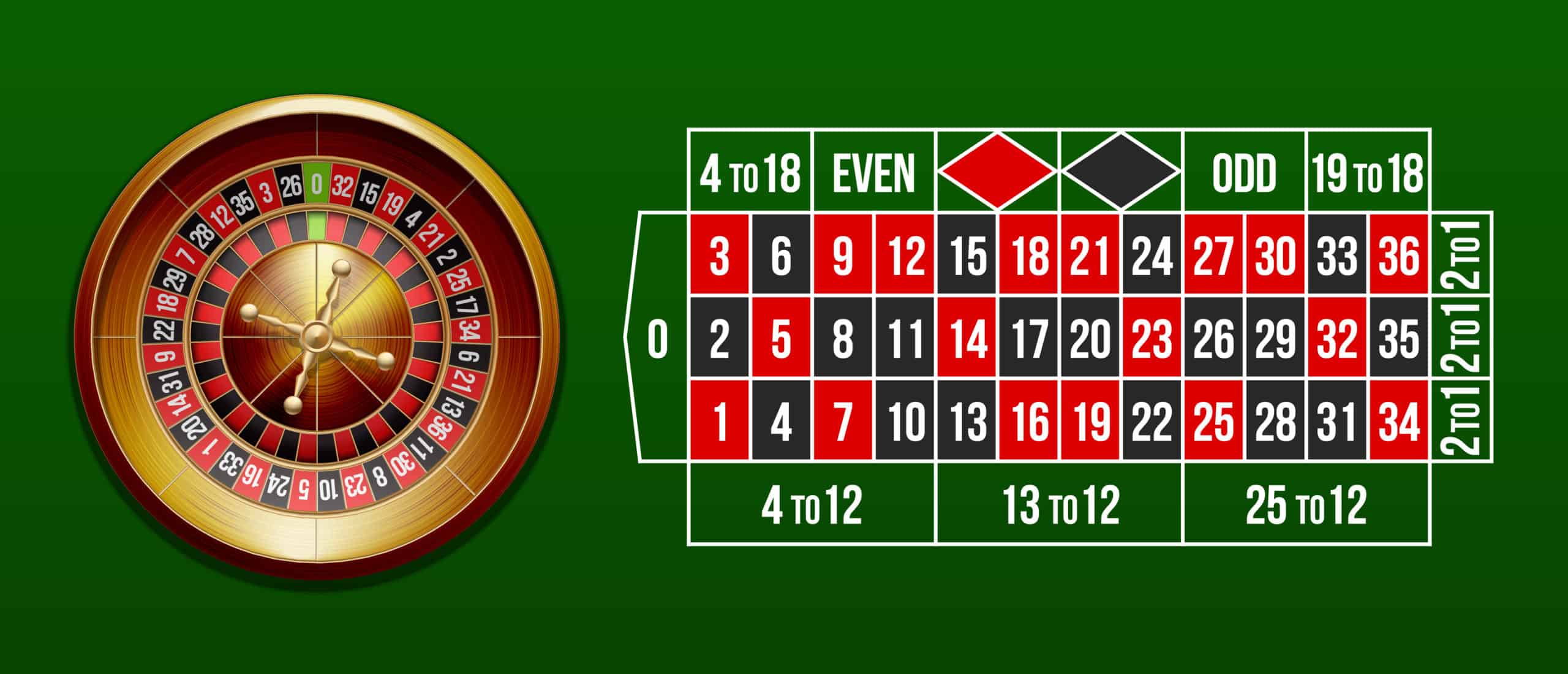
Let's Explore The Variations of Roulette
American Roulette:
American Roulette is a variant of the roulette game that features a wheel with 38 pockets, including a double-zero (00) alongside the regular single-zero (0) pocket. This additional double-zero pocket increases the house edge compared to other variants like European and French Roulette. With the double-zero, there are now two possible zero outcomes, doubling the chance of the ball landing on a zero, which effectively gives the casino a higher advantage.
European Roulette
European Roulette, on the other hand, is the classic version of the game and is played with 37 pockets, including a single zero (0) pocket but no double-zero. This slight difference in the number of pockets gives European Roulette higher chances of winning for players compared to American Roulette.
French Roulette:
French Roulette is similar to European Roulette in terms of using the same wheel and pockets. However, it incorporates two special rules – “En Prison” and “La Partage” – that are not typically found in other variants. These rules enhance the player’s odds and make it more favorable compared to both American and European Roulette.
In summary, American Roulette has a double-zero pocket, European Roulette has a single zero pocket, and French Roulette also has a single zero pocket but includes the beneficial En Prison and La Partage rules, making it the most advantageous option for players.
What are The Standard Bets In Roulette?
Roulette is a popular and exciting casino game at Las Vegas tables.
There are nine basic bets in roulette, including straight-up bets on a single number (pays 35 to 1), column bets (pays 2 to 1), and dozen bets (pays 2 to 1).
Even money bets cover ranges of numbers and colors and pay 1 to 1.
Split bets cover two numbers (pays 17 to 1), trio bets cover three numbers (pays 11 to 1), and quarter bets cover four numbers (pays 8 to 1).
Roulette is easy to play, and players can have a lot of fun with the game’s various betting options.
Inside and Outside Bets
In the game of roulette, both inside and outside bets are betting options available to players. The main difference between these two types of bets lies in the location of the bet on the roulette table and the odds of winning associated with each.
In summary, inside bets offer higher potential winnings but are riskier due to lower odds of winning, as they involve betting on specific individual numbers or small groups of numbers. On the other hand, outside bets provide lower payouts but better odds of winning, as they involve betting on larger groups or characteristics of numbers.
What is an Inside Bet?
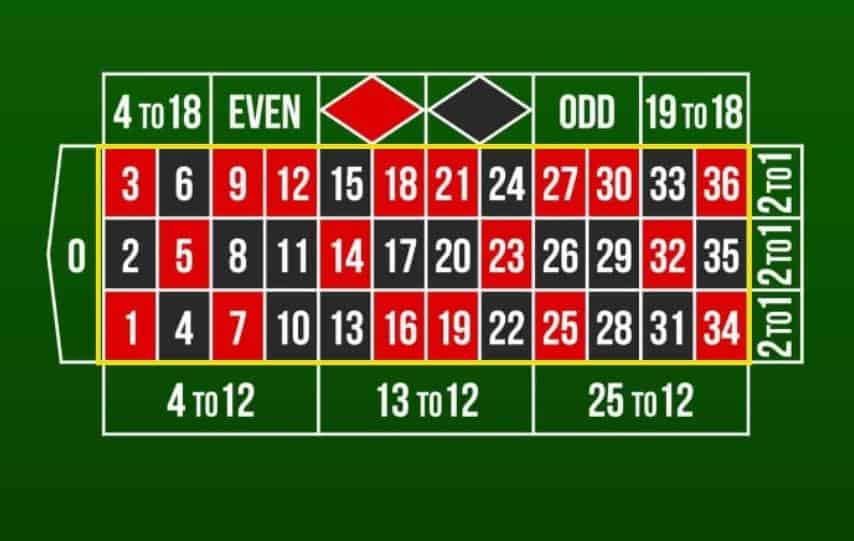
Inside Bet Examples
Inside Bets: These are bets placed on the inside part of the roulette table, where the numbers are located.
Straight Bet: Betting on a single number by placing the chip directly on that number. Pays out 35 to 1.
Split Bet: Betting on two adjacent numbers by placing the chip on the line between them. Pays out 17 to 1.
Street Bet: Betting on three numbers in a horizontal row by placing the chip on the outer edge of the row. Pays out 11 to 1.
Corner Bet: Betting on four numbers that meet at one corner by placing the chip at the intersection of those numbers. Pays out 8 to 1.
Line Bet: Betting on six numbers by placing the chip on the outer corner of two adjacent rows. Pays out 5 to 1.
What is an Outside Bet?
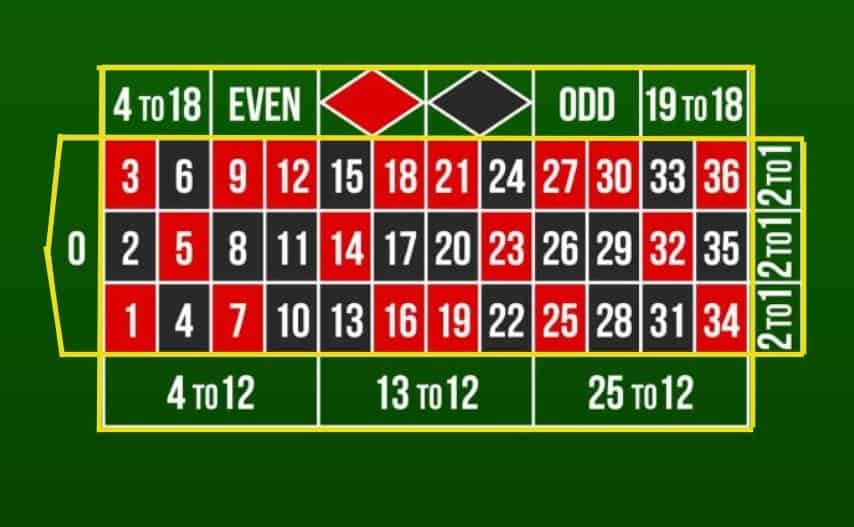
Outside Bet Examples
Outside Bets: These are bets placed on the outside part of the roulette table, offering lower payouts but higher odds of winning.
Red/Black: Betting on whether the ball will land on a red or black pocket. Pays out 1 to 1.
Odd/Even: Betting on whether the ball will land on an odd or even number. Pays out 1 to 1.
Low/High: Betting on whether the ball will land on a low (1-18) or high (19-36) number. Pays out 1 to 1.
Dozen Bet: Betting on a group of 12 numbers (1-12, 13-24, or 25-36). Pays out 2 to 1.
Column Bet: Betting on a column of 12 numbers. Pays out 2 to 1.
Additional Rules That Apply When Playing French Roulette Only
If you are playing French roulette instead of European roulette or American there are a few additional pieces of information you would need to be aware of due to the specific rules and features unique to French roulette. Here’s what you should know:
La Partage Rule: French roulette includes the “La Partage” rule, which applies to even-money bets (such as Red/Black, Odd/Even, and 1-18/19-36). When the ball lands on zero (0), you have the option to either retrieve half of your bet or let it remain “imprisoned” for the next spin. If you choose to leave the bet imprisoned and the next spin results in a win, you get your original bet back. This rule reduces the house edge on even-money bets, making French roulette more favorable compared to other variants.
En Prison Rule: Similar to the La Partage rule, French roulette features the “En Prison” rule, which also applies to even-money bets. When the ball lands on zero (0), you have the choice to either take back half of your bet or let the entire bet stay “en prison” for the next spin. If the subsequent spin results in a win, you get your full bet back. This rule further improves the player’s odds on even-money bets.
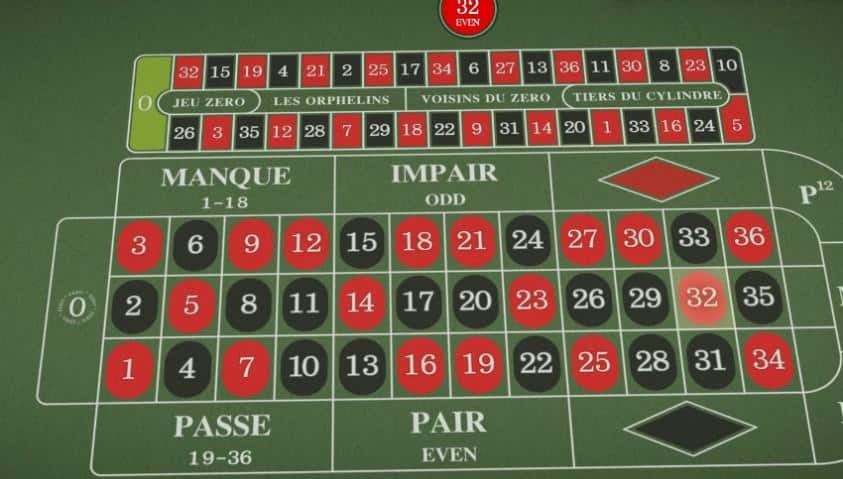
Differences In Table Layout: French Roulette Only
Table Layout: The French roulette table layout is slightly different from American and European layouts. The betting area and distribution of numbers on the wheel are distinctive. The numbers on the French roulette wheel are also colored differently from other variants. The single zero (0) is typically green, while other numbers are usually in red and black.
Call Bets: French roulette often allows players to place “Call Bets” or “Announced Bets.” These are special bets that cover specific sections of the roulette wheel, and they are typically based on the order of numbers on the wheel rather than their layout on the betting table. Some examples of call bets include Voisins du Zéro, Orphelins, and Tiers du Cylindre. These bets add complexity to the game and can be an interesting aspect to explore if you want to try something different.
Remember that these additional rules and features are specific to French roulette and are not typically found in other variants like American or European roulette. Understanding them is crucial if you want to make the most of your experience and take advantage of the lower house edge that French roulette offers.
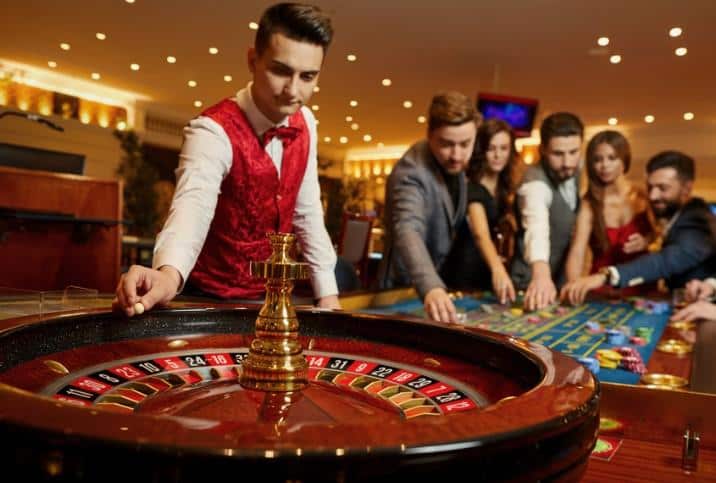
Tips: On How To Get The Best Out of Your Online Roulette Experience
Before playing roulette online as a new player, there are several important steps you should take to ensure a safe, enjoyable, and responsible gaming experience. Here’s what you should do:
Understand the Rules: Familiarize yourself with the rules of the specific roulette variant you plan to play. As mentioned earlier, there are different types of roulette games (e.g., European, American, French), and each may have slightly different rules and bet options. Knowing the rules beforehand will prevent confusion and mistakes during the game.
Choose a Reputable Online Casino: Make sure to select a trustworthy and licensed online casino. Research different platforms, read reviews, and check for valid gaming licenses to ensure the casino is legitimate and operates fairly.
Play for Free First: Many online casinos offer free-to-play versions of roulette games. Take advantage of these opportunities to practice and get comfortable with the game before wagering real money. Playing for free allows you to understand the mechanics, bet types, and strategies.
Understand the Odds: Roulette is a game of chance, and each bet has different odds of winning. Be aware of the odds associated with the various types of bets, including inside and outside bets, so you can make informed decisions on how to place your wagers...
Play Responsibly: Remember that gambling should be a form of entertainment and not a way to make money. If you find yourself developing signs of problem gambling, such as chasing losses, spending more than you can afford, or neglecting other responsibilities, seek help and consider self-exclusion options offered by reputable casinos.
By following these steps, new players can approach online roulette with confidence and enjoy the game responsibly while minimizing potential risks.
Understanding the Roulette Wheel: The roulette wheel consists of numbered pockets, ranging from 0 to 36 (in European roulette) or 00, 0 to 36 (in American roulette). The numbers alternate between red and black colors, with the 0 and 00 (in American roulette) being green.
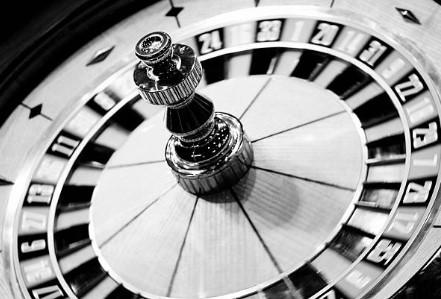
A Brief Loook Into the History of Roulette
Roulette, the iconic casino game known for its elegant spinning wheel, is one of the most popular and timeless gambling activities in the world. Its origins can be traced back through history, and the game has undergone various transformations to become what it is today. In this article, we will embark on a journey to explore the fascinating history of roulette, from its earliest mentions to its current prominence in casinos worldwide.
The Origin of Roulette
Early Beginnings
The roots of roulette can be traced back to ancient civilizations where various wheel-based gambling games were enjoyed. Some accounts suggest that the ancient Greeks and Romans engaged in similar games of chance involving spinning wheels. However, the modern version of roulette as we know it today began to take shape in Europe.
Blaise Pascal and the Invention of the Roulette Wheel
In the 17th century, the French mathematician and inventor Blaise Pascal is credited with conceptualizing the roulette wheel. Although his original intention was to create a perpetual motion machine, his invention laid the groundwork for the roulette wheel’s development.
Roulette in France
The term “roulette” itself comes from the French word for “little wheel.” The game gained popularity in 18th-century France, particularly among the nobility. However, early versions of the game had both single and double zeros, which slightly differed from the modern roulette wheel.
Roulette Spreads Across Europe
As the years passed, roulette gained popularity across Europe, and different regions adopted their variations of the game. The Germans, for instance, introduced a single-zero variant, which decreased the house edge and made the game more appealing to players.
The Evolution of Roulette
Introduction of the Single Zero
In the mid-19th century, Francois and Louis Blanc, two French brothers, introduced the single-zero roulette wheel in their casino in Germany. This innovation further improved the game’s odds and set the standard for the modern European roulette wheel.
The Arrival of Roulette in America
During the 19th century, European immigrants brought roulette to the shores of America. However, to maximize profits, American casino operators added a double zero to the wheel, creating the American roulette variant. This alteration increased the house edge and made it different from its European counterpart.
The Popularity of Roulette
Throughout the 20th century, roulette’s popularity skyrocketed in both Europe and America. The glamour and thrill associated with the game attracted players from all walks of life. Roulette became a symbol of elegance and sophistication in casinos, frequently depicted in movies and literature.
The Role of Casinos in Promoting Roulette
Casinos played a vital role in promoting roulette and making it accessible to a broader audience. The allure of the spinning wheel and the chance to win big drew in crowds, establishing roulette as one of the most profitable casino games.
Famous Roulette Stories and Legends
Over the years, roulette has been the subject of many fascinating stories and legends. From daring heists to miraculous wins, the game’s unpredictable nature has given rise to numerous anecdotes that continue to capture the imagination of players worldwide.
Online Roulette
With the rise of the internet and online gambling, roulette found a new platform to thrive. Online casinos offer various roulette variations, providing players with the convenience of playing from their homes.
Roulette in Popular Culture
Roulette’s popularity extended beyond the casino floor and into popular culture. The game has been featured in numerous movies, TV shows, and books, further solidifying its status as an iconic symbol of chance and excitement.
Strategies and Tips for Playing Roulette
While roulette is primarily a game of chance, players have developed various strategies and betting systems to improve their odds. From the Martingale to the D’Alembert system, we explore the effectiveness and risks associated with these strategies.
Is Roulette a Game of Chance or Skill?
The debate over whether roulette is a game of pure chance or involves an element of skill has been ongoing. We delve into the mathematics and probabilities behind roulette to determine the role of skill in this classic casino game.
The Global Impact of Roulette
Roulette’s reach extends far beyond the walls of casinos. Its cultural impact and influence on the gambling industry have had significant implications worldwide, shaping gambling legislation and practices in different countries.
The game of roulette has come a long way since its earliest mentions in history. From Blaise Pascal’s invention to the glitzy casino floors of Las Vegas, roulette has remained a symbol of chance and excitement. Its rich history, coupled with its timeless allure, ensures that roulette will continue to captivate players for generations to come.
You May Also Like:
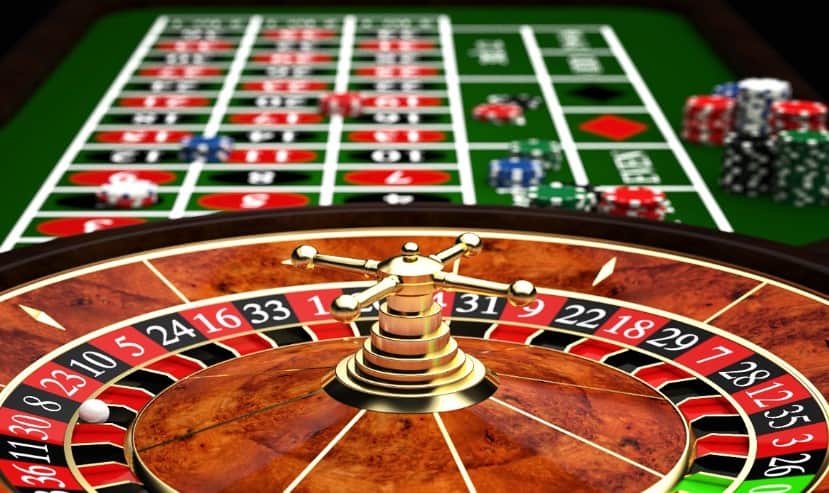
How to Play Roulette Step by Step Guide E-Vegas.com
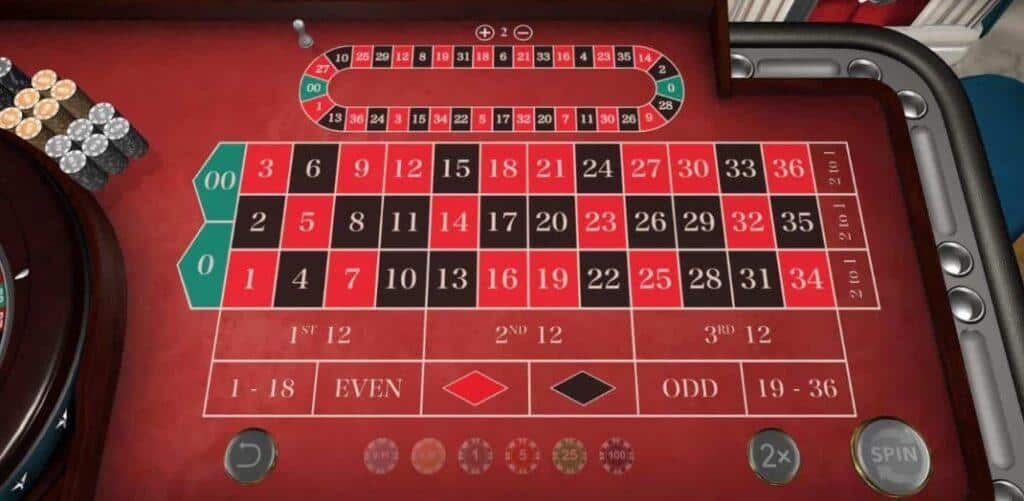
Roulette: American | Why American Roulette Online Is Not Your Best Roulette Option
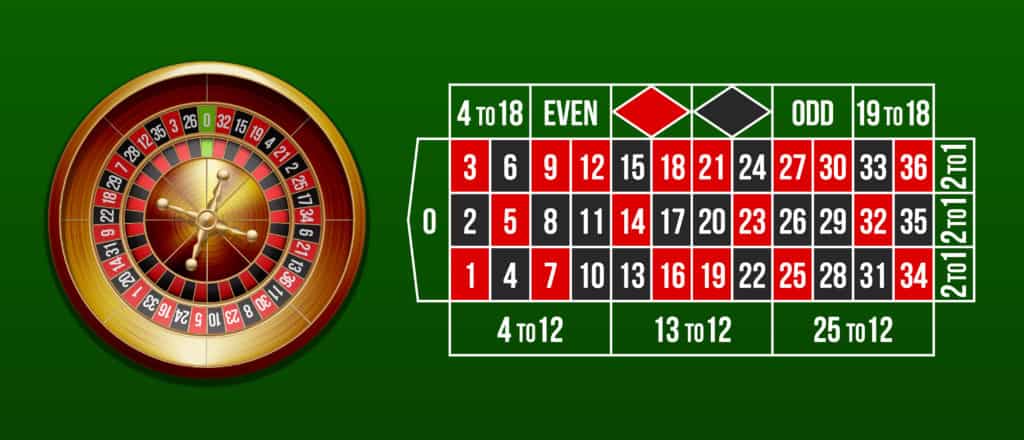
Roulette: European | What is European Roulette and How to Play? E-Vegas.com Guide

Roulette: French | What is French Roulette and How to Play? E-Vegas.com Guide
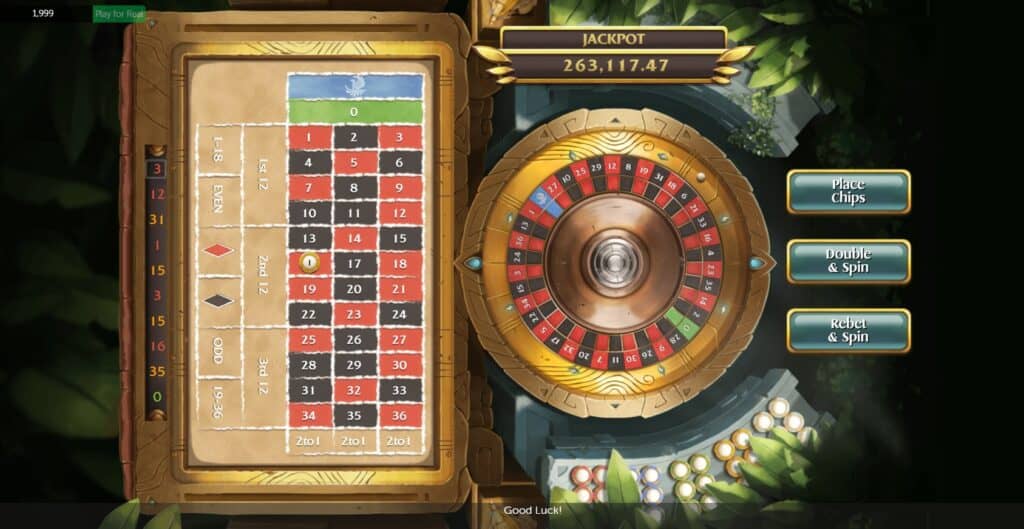
Game Review: First Person Phoenix Roulette | Roxor Gaming | E-Vegas.com Reviews
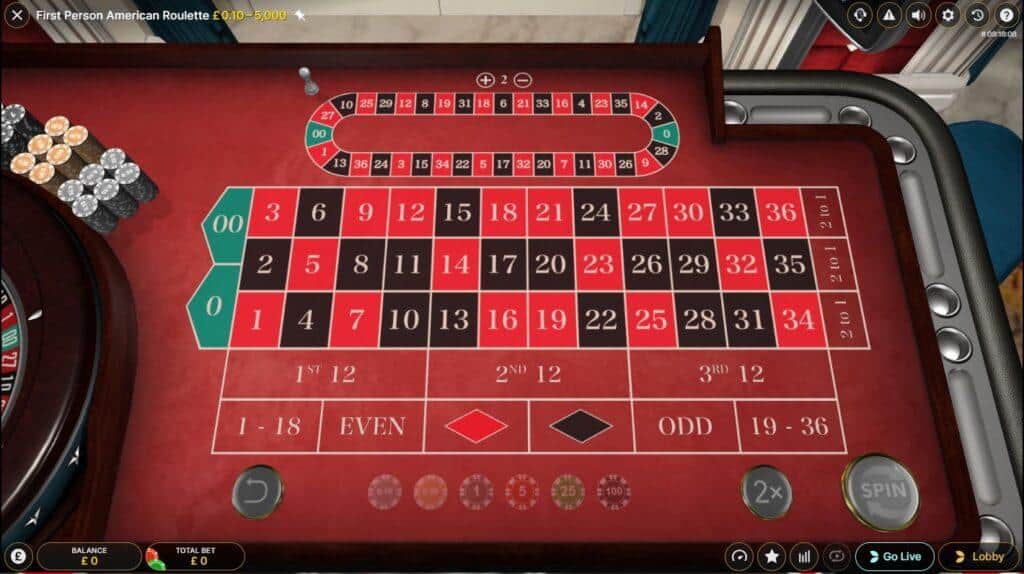
Game Review: First Person American Roulette by Evolution Gaming | E-Vegas.com Reviews
How to Play Basic Roulette FAQ:
1. What is online roulette?
Online roulette is a popular casino game available on the internet where players bet on the outcome of a spinning wheel with numbered pockets.
2. Is online roulette legal in the UK?
Yes, online roulette is legal in the UK, provided the operator is licensed and regulated by the UK Gambling Commission.
3. How do I play online roulette?
To play, you place bets on the roulette table, predicting where the ball will land once the wheel stops spinning.
4. What types of online roulette are there?
There are various types of online roulette, including European, American, and French roulette, each with different wheel layouts and odds. Top games include Lightning Roulette by Evolution Gaming, Mega Fire Blaze Roulette by Playtech, and Age of the Gods Roulette, also by Playtech.
5. Can I play online roulette for free?
Many online casinos offer free-play versions of roulette, allowing players to practice without using real money.
6. How do I know if an online casino is safe?
Look for online casinos with a valid UK Gambling Commission license and read reviews from reputable sources to ensure their credibility.
7. What payment methods can I use?
Online casinos typically offer various payment options, such as credit/debit cards, e-wallets (e.g., PayPal), bank transfers, and prepaid cards.
8. Is there a strategy to win at online roulette?
Roulette is a game of chance, and no strategy can guarantee a win. It’s essential to play responsibly and set limits.
9. Can I play online roulette on my mobile device?
Yes, most online casinos offer mobile-friendly platforms, allowing you to play roulette on smartphones and tablets.
10. What is the minimum and maximum bet on online roulette?
The minimum and maximum bet limits vary among online casinos, so check their specific rules before playing.
11. Are online roulette games fair?
Yes, but research and choose wisely where to play. Licensed online casinos use random number generators (RNGs) to ensure fair outcomes for their games, including roulette.
12. Can I chat with other players while playing online roulette?
Some online casinos have live dealer roulette games with chat features, allowing you to interact with both the dealer and other players.
13. What is the house edge in online roulette?
The house edge varies depending on the type of roulette you play. Generally, European roulette has a lower house edge than American roulette.
14. Are there any bonuses for playing online roulette?
Many online casinos offer bonuses and promotions, including welcome bonuses, free spins, and cashback, which may apply to roulette games.
15. Can I set betting limits on online roulette?
Responsible online casinos allow players to set daily, weekly, or monthly betting limits to manage their gambling activity.





